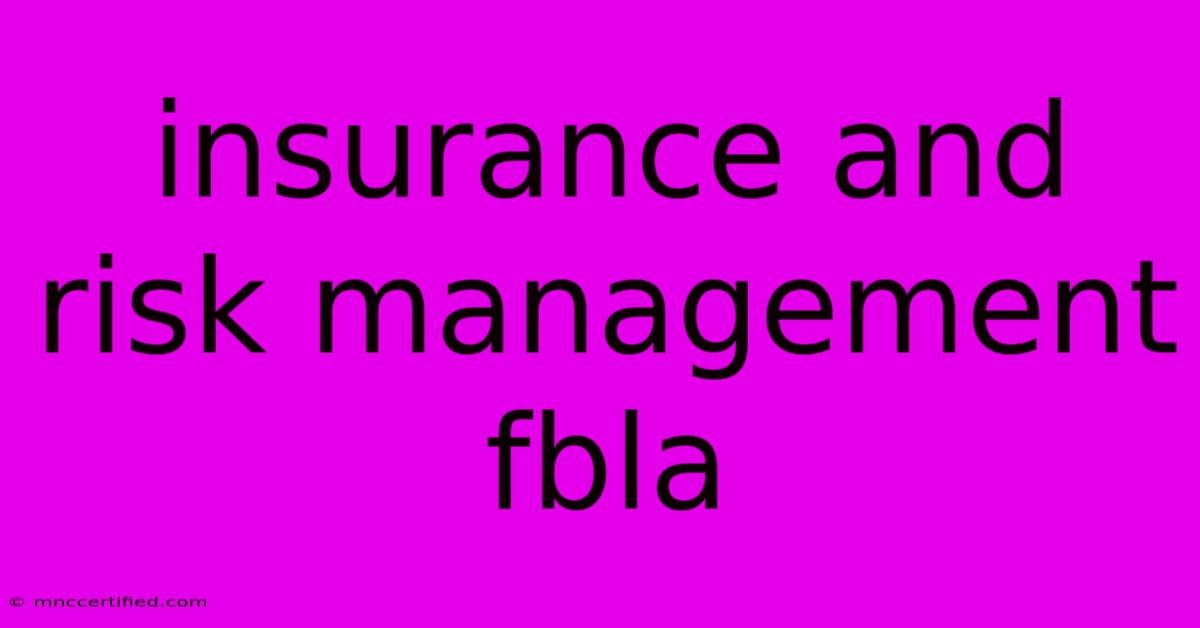Insurance And Risk Management Fbla

Table of Contents
Insurance and Risk Management FBLA: A Comprehensive Guide
The Future Business Leaders of America (FBLA) competition in Insurance and Risk Management challenges students to demonstrate their understanding of insurance principles, risk assessment, and various risk management strategies. This guide provides a comprehensive overview of the key concepts, offering valuable insights for students preparing for this event.
Understanding the FBLA Insurance and Risk Management Event
This FBLA event assesses students' knowledge across a broad spectrum of insurance and risk management topics. Expect questions covering various insurance types, risk identification and analysis, and the development of effective risk mitigation strategies. Strong performance requires a deep understanding of both theoretical concepts and practical applications.
Key Areas of Focus:
-
Types of Insurance: Students need a solid grasp of different insurance types, including:
- Property Insurance: Protecting against damage or loss to physical assets.
- Liability Insurance: Covering financial responsibility for injuries or damages caused to others.
- Life Insurance: Providing financial security to beneficiaries upon the death of the insured.
- Health Insurance: Covering medical expenses.
- Auto Insurance: Protecting against financial losses resulting from car accidents.
- Business Insurance: Protecting businesses from various risks, including property damage, liability, and business interruption.
-
Risk Identification and Assessment: This involves identifying potential risks, analyzing their likelihood and potential impact, and prioritizing them based on severity. Techniques like SWOT analysis and risk registers are valuable tools.
-
Risk Management Strategies: Students should be familiar with various risk management techniques, including:
- Risk Avoidance: Eliminating the activity that creates the risk.
- Risk Reduction: Implementing measures to lessen the likelihood or impact of a risk.
- Risk Transfer: Shifting the risk to a third party, such as through insurance.
- Risk Retention: Accepting the risk and setting aside funds to cover potential losses.
-
Insurance Concepts: Understanding key insurance terms and concepts is crucial. This includes premiums, deductibles, coverage limits, policy exclusions, and claims procedures.
-
Case Studies and Problem Solving: The competition often involves analyzing case studies and applying learned concepts to solve real-world risk management problems.
Preparing for the FBLA Insurance and Risk Management Competition
Effective preparation is key to success. Here's a structured approach:
1. Thorough Knowledge Base:
Begin by building a solid foundation in insurance and risk management principles. Utilize textbooks, online resources, and industry publications. Focus on understanding the "why" behind the concepts, not just memorizing definitions.
2. Practice, Practice, Practice:
Work through practice problems and case studies. This will help you apply your knowledge and develop problem-solving skills. Collaborate with your teammates to discuss different approaches and strengthen your understanding.
3. Stay Updated:
The insurance and risk management landscape is constantly evolving. Stay abreast of current trends and developments by reading industry news and journals.
4. Develop Presentation Skills:
Many competitions involve presentations. Practice delivering clear, concise, and persuasive presentations. This includes practicing your teamwork and communication skills.
Advanced Strategies for Success:
- Mock Competitions: Participate in mock competitions to simulate the actual event and identify areas for improvement.
- Mentorship: Seek guidance from experienced professionals in the insurance or risk management field.
- Networking: Connect with other FBLA members and professionals to expand your knowledge and build your network.
Conclusion:
The FBLA Insurance and Risk Management competition provides an excellent opportunity to develop valuable skills in a rapidly growing field. By following this comprehensive guide and dedicating sufficient time to preparation, students can significantly increase their chances of success. Remember that a strong understanding of fundamental principles, combined with practical application and effective communication, will set you apart from the competition. Good luck!

Thank you for visiting our website wich cover about Insurance And Risk Management Fbla. We hope the information provided has been useful to you. Feel free to contact us if you have any questions or need further assistance. See you next time and dont miss to bookmark.
Featured Posts
-
Cobra Kai Part 3 Season 6 Details
Nov 16, 2024
-
Pressure Washing Insurance Florida
Nov 16, 2024
-
Portugal Vs Poland Live 2 0 Uefa Nations
Nov 16, 2024
-
Birmingham Girl 9 Swims Mile Daily For Charity
Nov 16, 2024
-
Watch Portugal Vs Poland Uefa Nations League Time
Nov 16, 2024